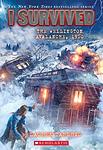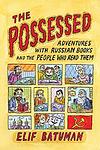The Greatest Bulgarian, Turkish "Fiction" Books Since 1980
Click to learn how this list is calculated.
This list represents a comprehensive and trusted collection of the greatest books. Developed through a specialized algorithm, it brings together 300 'best of' book lists to form a definitive guide to the world's most acclaimed books. For those interested in how these books are chosen, additional details can be found on the rankings page.
Genres
Countries
Date Range
Reading Statistics
Click the button below to see how many of these books you've read!
Download
If you're interested in downloading this list as a CSV file for use in a spreadsheet application, you can easily do so by clicking the button below. Please note that to ensure a manageable file size and faster download, the CSV will include details for only the first 500 books.
Download-
1. My Name is Red by Orhan Pamuk
Set in the late 16th century Ottoman Empire, this novel explores the conflict between East and West, tradition and innovation, through the lens of miniaturist painters. When a renowned artist is murdered, his colleagues must solve the mystery while grappling with the changes in their art brought about by the western Renaissance. This complex narrative intertwines love, art, religion, and power, offering a deep exploration of the struggles between old and new.
-
2. Snow by Orhan Pamuk
Set in the small city of Kars in northeastern Turkey, the novel follows a Turkish poet who has spent several years in political exile in Germany. He returns to Turkey during a time of political unrest, with tensions high between religious and secular factions. As he becomes embroiled in the turmoil, he also becomes involved in a romantic relationship with a beautiful woman. The city is cut off from the rest of the world by a relentless snowstorm, leading to a series of tragic events. The novel is a contemplation on love, faith, and the tensions between tradition and modernity.
-
3. A Ballad for Georg Henig by Viktor Paskov
"A Ballad for Georg Henig" is a narrative that explores the life of a Jewish craftsman and violin maker, Georg Henig, in the 18th century. The story is set in Bulgaria and delves into the historical events and cultural dynamics of the time, including the Ottoman rule and the social status of Jews. The protagonist's life is filled with love, loss, and the quest for artistic perfection, all against the backdrop of a society marked by religious and ethnic tensions.
-
4. Natural Novel by Georgi Gospodinov
"Natural Novel" is a thought-provoking and imaginative work that seamlessly weaves together various narratives and perspectives. The book explores the concept of storytelling and its power to shape our understanding of reality. Through a blend of fiction, memoir, and philosophical musings, the author delves into the complexities of human existence, the interconnectedness of life, and the search for meaning in a world filled with both beauty and tragedy. With its poetic prose and profound insights, "Natural Novel" invites readers to contemplate the boundaries between truth and fiction, ultimately challenging conventional notions of storytelling.
-
5. Life is a Carawanserai Has Two Doors I Went in One I Came out the Other by Emine Sevgi Özdamar
This novel follows the life of a young Turkish girl growing up in the 1950s and 60s, exploring her experiences in a rapidly changing society. The protagonist navigates the complexities of her family life, her struggle with her identity and her eventual emigration to Germany. The book explores themes of female empowerment, cultural clashes, and the immigrant experience, all told through a unique narrative style that blends reality with dreams and folktales.
-
6. Avalanche by Blaga Dimitrova
The novel explores the psychological and emotional landscapes of its characters against the backdrop of a natural disaster. It delves into the lives of a group of people trapped in a mountain hotel by an avalanche, examining their personal stories, relationships, and the societal structures that define them. As they confront the possibility of death and the breakdown of social order, the characters are forced to reevaluate their lives, revealing the complex interplay of human nature and the forces beyond our control. The narrative weaves together themes of love, betrayal, and the quest for meaning, all while questioning the very essence of existence and human connection amidst the chaos of the avalanche.
-
7. Солунският чудотворец by Fani Popova-Mutafova
The book is a historical novel set in the early 20th century, revolving around the life of a revered monk known for his miraculous healing powers in the city of Thessaloniki. The narrative delves into the complexities of the Balkan Wars and the socio-political turmoil of the era, as seen through the eyes of various characters whose lives intersect with the monk's. As they seek solace and miracles, the story explores themes of faith, hope, and the human struggle, painting a vivid picture of the period's cultural and historical landscape.
-
8. Wolf Hunt by Ivaylo Petrov
"Wolf Hunt" is a historical novel set in the early 20th century in a rural Bulgarian village, where the lives of peasants are depicted with stark realism. The narrative revolves around a group of villagers who are tasked with hunting down a wolf that has been terrorizing their livestock. As the hunt progresses, the story delves into the complex relationships and social dynamics within the community, revealing the struggles, hardships, and resilience of the human spirit in the face of poverty, oppression, and the changing tides of history. The novel serves as a metaphor for the political and social upheavals of the time, exploring themes of survival, morality, and the human condition.
-
9. Berji Kristin by Latife Tekin
The book is a poignant exploration of the lives of squatters in the outskirts of Istanbul during the 1970s and 1980s. Through a blend of magical realism and stark social commentary, it tells the story of a community of rural migrants who, in search of better prospects, build a shantytown named "Flower Hill" on the city's periphery. The narrative delves into the daily struggles, dreams, and communal bonds of these individuals as they grapple with the harsh realities of urban poverty, political upheaval, and rapid modernization that threaten to erase their makeshift neighborhood. The novel is a tapestry of interconnected tales that together paint a vivid portrait of resilience and survival amidst systemic marginalization.
-
10. The Black Book by Orhan Pamuk
The novel focuses on a man searching for his wife in Istanbul, who disappeared without a trace. In his search, he discovers a secret, surreal world in the city and starts to understand his wife's involvement in political activism. The narrative is interwoven with stories from a column written by his wife's half-brother, which the protagonist believes may hold clues to her disappearance. The book is a complex exploration of identity, storytelling, and the role of literature in society.
-
11. Ние, мушмороците by Viktor Samuilov
The book is a satirical exploration of the human condition, set in a dystopian society where the ruling class, known as "mushmoroks," exercises absolute control over the lives of the citizens. Through a blend of dark humor and sharp social commentary, the narrative delves into themes of power, conformity, and the loss of individuality, presenting a bleak yet insightful reflection on the dangers of totalitarianism and the importance of resisting oppression. The story, while fictional, serves as a cautionary tale, urging readers to question authority and the structures that seek to diminish the human spirit.
-
12. The Forty Rules of Love by Elif Shafak
This novel intertwines two parallel narratives, one set in the 13th century and one in the modern day. The contemporary story follows a discontented American housewife who, while working as a reader for a literary agency, comes across a novel about the 13th-century poet Rumi and his spiritual mentor, Shams of Tabriz. As she delves into their story, she uncovers Shams' forty rules of love and begins to question her own life and relationships. The historical narrative, on the other hand, explores the transformative friendship between Rumi and Shams, and how their bond revolutionized Rumi's poetry and outlook on life.
-
13. The Museum Of Innocence by Orhan Pamuk
This novel delves into the obsessive love of Kemal, a wealthy Istanbulite, for Füsun, a distant relative and a shopgirl, which begins in 1975 and spans over 30 years. After a brief affair, Füsun marries another man, but Kemal's love remains unyielding. He starts collecting objects that remind him of his love for her, eventually creating a museum dedicated to their relationship. Set against the backdrop of Istanbul's changing society, the story explores themes of love, longing, class, and the power of memory, as Kemal's life becomes a testament to his unattainable desire, encapsulated within the walls of his museum.
-
14. 18% Gray by Zachary Karabashliev
In this gripping novel, a man finds himself at a crossroads in life, grappling with the loss of his wife and the disintegration of his marriage. In a spontaneous attempt to escape his pain and find meaning, he embarks on a transformative journey across America with a stolen stash of marijuana and a camera, capturing moments of beauty and introspection. As he travels from the East to the West Coast, his road trip becomes a quest for redemption and self-discovery, revealing the complexities of love, memory, and the pursuit of happiness.
-
15. The Possessed by Elif Batuman
"The Possessed" is a compelling narrative that combines memoir, criticism, and travel writing to explore the author's deep fascination with Russian literature. Through her experiences as a graduate student at Stanford, her travels to Turkey, Russia, and Uzbekistan, and her encounters with other scholars, the author delves into the works of great Russian authors such as Tolstoy, Dostoevsky, and Chekhov, while also reflecting on the nature of literature, identity, and the human condition.
-
16. The Bastard of Istanbul by Elif Shafak
"The Bastard of Istanbul" is a novel that tells the story of two families, one Turkish and one Armenian American. It explores the deep, intricate history between the two nations through the eyes of the characters, while also tackling themes of identity, memory, and the past. The narrative unfolds through the perspectives of the women in both families, who carry the burden of their ancestors' secrets, and a young man haunted by the ghost of a long-dead Armenian. The novel delves into the complexities of love, family, and the lasting effects of the Armenian genocide on its descendants.
-
17. Моливко и Сръчко в България by Valentin Postnikov, Adrian Lazarovski
This children's book is a delightful journey that introduces young readers to the rich cultural and historical heritage of Bulgaria through the adventures of two charming characters, Моливко and Сръчко. As they traverse the beautiful landscapes of Bulgaria, they encounter various landmarks, traditions, and tales that are emblematic of the country's identity. Through their eyes, readers are invited to explore Bulgaria's treasures, from its ancient monuments to its vibrant festivals, fostering a sense of curiosity and appreciation for the nation's legacy and the wider world around them.
Reading Statistics
Click the button below to see how many of these books you've read!
Download
If you're interested in downloading this list as a CSV file for use in a spreadsheet application, you can easily do so by clicking the button below. Please note that to ensure a manageable file size and faster download, the CSV will include details for only the first 500 books.
Download








